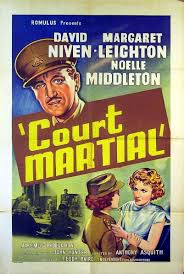| Carrington V.C. | |
|---|---|
 U.S. theatrical poster | |
| Directed by | Anthony Asquith |
| Written by | John Hunter |
| Based on | Carrington V.C. by Campbell Christie and Dorothy Christie |
| Produced by | John Woolf Teddy Baird |
| Starring | David Niven Margaret Leighton Noelle Middleton |
| Cinematography | Desmond Dickinson |
| Edited by | Ralph Kemplen |
Production company | |
| Distributed by | Independent Film Distributors |
Release date |
|
Running time | 105 minutes |
| Country | United Kingdom |
| Language | English |
| Box office | £141,608 (UK) [1] |
Carrington V.C., also known as Court Martial in the United States, is a 1954 British legal drama film directed by Anthony Asquith and starring David Niven, Margaret Leighton and Noelle Middleton. Others in the cast include Allan Cuthbertson, Victor Maddern, Raymond Francis, Michael Bates, Laurence Naismith, Geoffrey Keen and Maurice Denham. Made by Romulus Films it was distributed by the company's Independent Film Distributors and released in the United States by Kingsley-International Pictures. It was adapted for the screen by John Hunter from the play of the same name by Campbell and Dorothy Christie. It was produced by Teddy Baird. [2]
Contents
It was shot at Shepperton Studios near London with sets designed by the art director Wilfred Shingleton. The Victoria Cross worn by Niven in the film was that awarded to Arthur Henry Cross for service in World War I. [3]